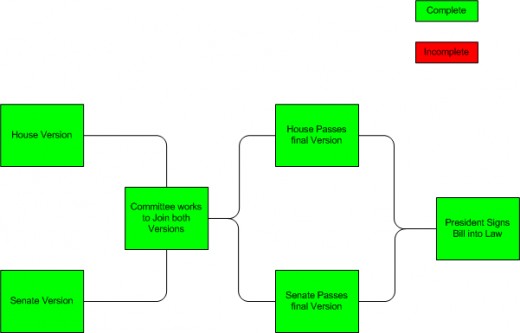Provisions of the Health Care Reform Bill
The Patient Protection and Affordable Care Act
Public Law 111-148 - Passed and Signed April 2010
Surely there will detractors and proponents of this bill. But how many people, including those who voted for or against it, actually know what is in the bill? From what I've been reading very few.
The bill, as originally drafted, was a Senate alternative to the Affordable Health Care for America Act,. This act was passed by the House November 7 2009, but after the Democratic party lost their supermajority in the Senate on January 19, 2010, the House or Representatives decided to pass the Senate version and amend it with a third bill.
This allowed the Senate to pass
the amendments via the simple-majority reconciliation process. This is currently working it's way through congress with a considerable amount of resistance from the Republican Party and some "blue dog" democrats.

Whats in the Bill?
A lot actually.
Two provisions that have the insurance companies most upset are:
- A provision that limits their profits, by law, to fifteen (15%) percent, even though this provision will not take effect for some years. Most of the bill will be implemented in January 1, 2014 almost a full four years from now.
- A provision that requires insurers to report earnings and health-care spending. The data will be displayed on the Secretary of Health and Human Services web-site
Effective June 23, 2010
- Adults with pre-existing conditions will be eligible to join a temporary high-risk coverage pool. This does not prevent insurance companies from banning coverage due to pre-existing conditions nor does it affect existing policies. It simply gives adults an option for coverage that cannot or will not be provided by insurers.
- Children cannot be banned from coverage due to pre-existing conditions.
Effective September 21, 2010
- Parents can retain their children on their insurance plans until the child's twenty-sixth birthday.
- Insurers cannot charge a co-pay for preventative care on all new insurance plans. Plans already in effect do not have this restriction.
- Those affected by the Medicare Part D coverage gap can apply for a $250 rebate. In 2011 50% of that gap will be eliminated.
- Insurers' can no longer enforce annual spending caps. These caps will be completely prohibited by 2014.
- Insurers cannot drop policy holders due to illness.
- Insurers must provide transparency in their administrative and executive costs. This information will be supplied to the Department of Health and Human Services. That department will post the results on its website.
- Insurers will be required to provide patients with an appeals process for coverage and claims on all new plans. Existing plans are unaffected.
- Indoor tanning salons will be subject to a 10% service tax.
- Fraud detection will be implemented. This provision is vague; will it apply to patients, insurance companies, or both.
- Rural hospitals and facilities will be included in Medicare coverage.
- Non-profit Blue Cross insurers will be required to maintain a loss ratio of 85% (or more) to take advantage of IRS tax benefits.
- Companies which provide early retiree benefits (aged 55-64) will be eligible to reduce premium costs.
- A new
website maintained by the Secretary
of Health and Human Services will be set up to provide consumer
insurance
information.This is where reporting by insurers to the D.H.H.S. is reported to the public.
- A temporary credit program will be established. This program will be designed to encourage private investment in new therapies for both treatment and prevention of disease.
Effective by January 1, 2011
- Insurers will be required to spend 85% of large group plan premiums, minus certain expenses, on health care or to improve health care quality. This provision does not extend to privately purchased insurance or "small" group plans.
- The percentage for small group and individual plans is 80% though the Secretary has the ability to adjust that rate for a state if it would destabilize the state market.
- States will be allowed to apply more rigid standards in both cases.
- If insurers spend a lower percent of premiums on patient coverage they will be required to issue a rebate to the customer any difference.
- Insurers will
also be required to report to the U.S. Department of Health and Human Services on how premiums are spent for each plan year. They will also be required to report on how portions not spent on health-care are being distributed.
- U.S. Department of Health and Human Services will then post this information on a web site by July 1, 2011. This ties in with provision 13 implemented on September 21, 2010. (Title IX, Subtitle A, Sec 10101(f), amending Sec 1001(5), which amends Sec 2718 of the Public Health Service Act)
Effective by January 1, 2014
- All insurers will be completely prohibited from discriminating against any insured
- All insurers will be prohibited from charging higher rates for any individual based on pre-existing medical conditions
- All insurers will be fully prohibited from establishing annual spending caps
- Medicaid eligibility will be expanded; individuals with incomes up to 133% of the poverty line qualify for coverage
- Tax credits will be extended to small business who has fewer than 25 employees and provide health care benefits for them
- A $2,000 per employee tax penalty will be levied on employers with over 50 employees who do not offer health insurance to their full-time workers
- Impose an annual $695 fine on individuals who do not obtain health insurance; exemptions to fine in cases of financial hardship or religious belief
- Creation of a new voluntary long-term care insurance program
- Creation of tax credits for individuals who purchase private insurance policies
- Employed individuals who pay more than 9.5% of their income on health insurance premiums will be permitted to purchase insurance policies from a state-controlled health insurance option
- Pay for new spending, in part, through spending and coverage cuts in Medicare Advantage, slowing the growth of Medicare provider payments, reducing Medicare and Medicaid drug reimbursement rate, cutting other Medicare and Medicaid spending
- Revenue increases from a new $2,500 limit on tax-free contributions to flexible spending accounts (FSAs), which allow for payment of health costs
- Chain restaurants and food vendors with 20 or more locations are required to display the caloric content of their foods on menus, drive-through menus, and vending machines. Additional information, such as saturated fat, carbohydrate, and sodium content, must also be made available upon request
- Establish health insurance exchanges
- Subsidize insurance premiums for individuals with income up to 400% of the poverty line, as well as single adults
- Members of Congress and congressional staff will only be offered health care plans through the exchange or plans otherwise established by the bill
- The Federal Employees
Health Benefits Program (congresses health insurance plan) will be dissolved
Poverty Thresholds 2009
Perrsons in Family
| Poverty Guideline
| Subsidy Threshold @ 133%
|
|---|---|---|
1
| 10,830
| 14,403
|
2
| 14,570
| 19,378
|
3
| 18,310
| 24,352
|
4
| 22,050
| 29,326
|
5
| 25,790
| 34,300
|
6
| 29,530
| 39,274
|
7
| 33,270
| 44,249
|
8
| 37,010
| 49,223
|
Mandated Coverage
Mandated coverage, one of the key sticking points for Republicans, is actually an idea first put forward by Republicans almost two decades ago. When Bill and Hillary Clinton put forward their own health-care reform proposal Republicans posited that any workable system would have to include mandated coverage or the reform would simply collapse under the weight of limited premiums and ever increasing expenses.
In 2006 Mitt Romney signed into Massachusetts law mandatory insurance coverage as "a personal responsibility principle." Mr. Romney now claims that the passed health-care reform packages bears little resemblance to the state bill he signed into law.
In a sense he is correct. One is a federal package affecting all Americans and his was at a state level only; affecting only citizens of Massachusetts.
As seen in the paragraphs above, 2014 will usher in a new provision of the law that will require almost all Americans (except on economic or religious grounds) to be covered. This coverage can be through an employer, directly by the citizen, or through a government program (the public option). In 2014 new insurance markets will begin requiring insurers to accept all applicants. Tax credits will help those who cannot afford coverage to get coverage.
Should a citizen choose not to buy health insurance the IRS will be required to levy a penalty. Exceptions to this penalty are financial hardship or religious belief.
These penalties will be on a sliding scale depending in yearly income and family size. A single individual making $45,000 annually will face a $1,125 fine; this provision will be take effect in 2016.
Naturally, universal health insurance coverage will not work if policies are only purchased when the insured becomes ill. Since the policy insurers will be required to provide coverage regardless of circumstances. Without a pool of healthy citizens paying into the system it will collapse under the onslaught of claims with no incoming premiums to offset those claims.
The Republican party and many of its members have known this for decades.
They Were For it Before They Were Against It
The simple fact that Democratic party members were required to embrace the mandate in order to get the bill passed seems to be enough to "force" Republican party members to reject the mandate. Even though it was their idea to begin with.
Mitt Romney met with popular success in Massachusetts when he gained bipartisan support for a health plan that featured a coverage mandate. In fact many Democrats point to this mandate directly when highlighting it's inclusion in the national health-care bill.
The Future
A Slow and Agonizing Attempt at Crippling
There's no doubt in my mind that the right will work hard for the next decade (if not longer depending on their success) to hamstring, cripple, or destroy some if not all of the provision of this bill. If for no other reason than the Democratic Party passed it.
If you have any doubt of this yourself simply look at some of the ads (which I have no control over) attached to this hub. At least one of them will call the bill a sham, a hoax, a travesty and feature an unflattering photo of one of the champions of the bill.
I predict that these attempts will be largely unsuccessful.
I also predict that the package will undergo many changes as the law is fine-tuned to protect profits and patients alike.
Insurance Shakeups
I fully expect to see some insurers fall by the wayside when they can no longer be profitable in the face of these new rules. I also expect to see a change in the make-up of investment packages. Insurers, the darlings of the investment portfolio, will be reclassified to a less profitable, yet more stable investment option. Of course the stability will take years to establish. The 15% profit cap imposed on insurers starting January 1, 2011 (item 1
of that section) is will have profound and long-lasting effects on the industry.
The mandated reporting and public airing of their expenditures and profit picture will have less of an impact, but an impact none the less. I base this particular opinion on other federal reporting requirements that are routinely published and roundly ignored.
Of course, I fully expect a fair amount of "creative accounting" to come about due to this provision...with the subsequent federal suits, fines, and counter-suits.
However, despite all of these potential pitfalls, insurance companies will also have a near captive client base. Their main challenge will be to convince a public now required to buy insurance that they are the best company to insure with.
National Health Insurance Companies
I also expect to see a national health care insurer in the near future. It's the only logical conclusion. In an attempt to spread the risk, expand it's clientele, and protect profits insurance companies will now have to consider expanding into all states. The bill itself encourages this.
I further expect to see some insurance companies that have not included health insurance in their stable of products to now consider going into that line of coverage. Will Farmer's, State Farm, Progressive and Geico begin offering health plans? Time will tell.
New Businesses
Health insurance exchanges will become a new business with challenging new business models. There is no provision in the law restricting these exchanges strictly to a government entity. Rather an exchange will have to be a company or cooperation.
Also there is no provision in the law for monitoring and requiring reporting from these exchanges as there is with the insurers. I think there is a reasonable profit potential in this new businesses model.
Religious Objection
Financial hardship will be easy to prove. I'm certain some families or principals of those families will be caught trying to "rig" the system by not claiming all of their income.
But what might be the most amusing to watch will be claims of religious exemption. Seventh Day Adventists and Christian Scientists may have "legs to stand on", but I'm quite certain others will attempt to create of adopt religious organizations in order to avoid coverage.
The government will then have to enforce standards similar to those established for conscientious objector status during the days of the draft.
Tanning Salon Debacle
I predict that this form of business with either disappear entirely or have to go through a drastic restructuring to survive.
Will there be "underground" tanning salons? It wouldn't surprise me.
Socialized Whatever
One of the most loudly proclaimed problems with this legislation is the socialization of medicine.
In some areas I don't disagree. The constitution is quite clear, on a federal level, as to what the American citizen can expect of its government and what the federal government is banned from enforcing.
The tenth amendment, as a state centric clause, is quite clear that law not covered in the body of the constitution is reserved to the states or individuals.
Of course this is a very weak argument. All manner of national laws flout the tenth. From automobile safety standards to recreational drug use and transportation.
Socialism, from a macro view, is an organization of economic institutions and methods of resource allocation. A socialist system requires all participants pay into the system, thereby owning the system, and a limited number of those participants benefit from the systems based on need. Because all are required to pay into it, such a system is not capitalist.
But, we have many socialist systems in place and depend on them daily. Police departments, fire departments, the postal system, water and power, public libraries and parks are all socialist in nature. We all pay into them and only a limited number of us benefit.
Should all of these systems be banned?
Medicaid
On March 30, 2010 President Obama signed into law another provision approved by the house that requires Medicaid to pay primary care physicians at 100 percent of the Medicare rate in 2013 and 2014.
This addendum also strengthens Pell grants as well as offering loan forgiveness and loan repayment plans to medical students. The stated purpose of these provisions is to encourage graduating medical students to go into primary care.
Coda
Please be careful in your purchases of insurance. Your best defense is to become familiar with the provisions of this bill. There will likely be intense pressure for insurers to sell policies before the effective date of January 1, 2014. Insurers will promote the purchase of health insurance, especially large group policies, before the date above. This will work to their advantage.
It is not beyond the realm of possibility that insurance brokers and agents will attempt, or be encouraged, to take advantage of this bill by convincing potential buyers that they are required to buy a policy before January 1, 2014.
From my reading of this bill January 1, 2014 is the effective date for the levying of fines against those who do not purchase health insurance. Those who do not purchase health insurance before that date should be safe. In other words it will be three years from the writing of this hub before fines are collected from those without a health-plan.
Disclaimer
Except for the Mandated Coverage, They Were For It Before They Were Against It, and Socialized Whatever sections this hub attempts to be as non-partisan as possible in it's reporting. Despite this I've tried to find "silver linings" in this bill for the average Joe/Josephina. It hasn't been easy.
The author was not compensated in any way for the contents of this hub.
A small percentage of ad revenue from the attached ads, which the author has no control over, could generate some small income.








